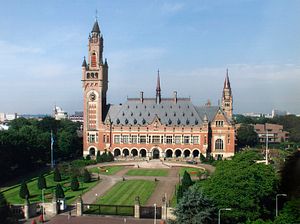The Permanent Court of Arbitration (PCA) in The Hague, Netherlands will be in the international spotlight this week when it announces its ruling in the case “Philippines v. China.” At the heart of the arbitration case brought by the government in Manila are Chinese activities in the South China Sea and the question of whether they violate the sovereign rights of the Philippines.
Territorial claims, commercial use, and freedom of navigation in the South China Sea have been disputed between the littoral states Brunei, China, Taiwan, Malaysia, the Philippines and Vietnam since the 19th century. However, disagreements between the littoral states started turning outright hostile in 2013 when China began materializing its respective claims by aggressively building artificial islands in the South China Sea and militarizing these islands. As a reaction to Chinese construction around the Spratly Islands, the Philippines brought its case in the PCA in January 2013 arguing that Chinese activities around the Spratly Islands and within the so-called “nine-dash line,” China’s extensive demarcation line covering significant parts of the South China Sea, violate agreements of the United Nations Convention on the Law of the Sea (UNCLOS) on territorial seas and exclusive economic zones. China on the other hand argues that bilateral agreements are sufficient for solving disagreements between both states and has continued its infrastructure construction unilaterally.
Despite the fact that both the Philippines and China are members of the PCA, Chinese officials have not only rejected arbitration at the PCA, but also questioned the jurisdiction of the PCA over the issue in question. In an interview with CCTV on May 7, 2016, Director General for Boundary and Ocean Affairs in the Chinese Foreign Affairs Ministry Ouyang Yujing said that “the Philippines’ unilateral initiation of the South China Sea arbitration is a political farce under the cloak of law” and that “China will not accept or recognize it.” Emphasizing its desire for bilateral treaties, China has repeatedly rejected external demands for multilateral negotiation through ASEAN or bodies such as the PCA.
This week’s ruling is of significance because it marks the first time a court passes judgment on claims and counter-claims in the region. Ever since China started building artificial islands in the South China Sea and militarizing them, the response of the international community has been slow and ambiguous. Given the importance of the South China Sea as a critical international navigation route for container ships and super tankers, the question remains which steps Britain and its international partners are willing to take in order to uphold stability in the region.
Following the ruling by the PCA, British policymakers will likely emphasize their continued belief in the jurisdiction of the PCA and underline their commitment towards enforcing the PCA ruling. If only to uphold order and accountability in the international system, policymakers in Westminster have to be clear towards Beijing that the PCA ruling is legally binding to both Beijing and Manila.
On an international level, Beijing continues to seek recognition as a responsible actor in the international system. China, as a permanent member in the Security Council, can be expected to respect the upcoming ruling of the PCA. Britain should try and convince policymakers in Beijing that Chinese interests are best pursued in coordination rather than confrontation with international institutions. Britain and its G7 partners have an opportunity to raise their strong concerns over the activities in the South China Sea at the upcoming G20 summit under Chinese presidency later this year.
Britain’s position towards the conflict in the South China Sea is generally best pursued in coordination with its European and international partners. However, China’s position may further harden if Britain and its international partners insist on their critical view, potentially resulting in further tension. Britain should therefore remain open to act as an intermediary between the respective parties in the region and indicate a willingness to develop enforcement procedures for the PCA ruling that are agreeable to the Philippines and China alike.
Sooner or later, however, policymakers in Westminster will also need to develop an understanding over the extent to which Britain is willing to enforce its view of the legalities in the South China Sea, even if enforcing this view is detrimental to more immediate British economic interests.
The Philippines expects the PCA ruling to clarify three aspects: first, which elements in the South China Sea classify as islands, low tide elevations, reefs or submerged banks; second, which territory is the Philippines allowed to claim under existing UNCLOS rights; and third, determining if China has violated sovereign territory of the Philippines. While China may not like this week’s ruling of the PCA, it will be a first step towards clarifying claims in the South China Sea and perhaps putting an end to ambiguity and insecurity in the region.
Tim Steinecke is a consultant and researcher specializing in Asian foreign policy, Asia-Africa relations, and national oil companies. Tim can be found and contacted via Twitter @TimSteinecke. The views expressed here are the author’s own.

































